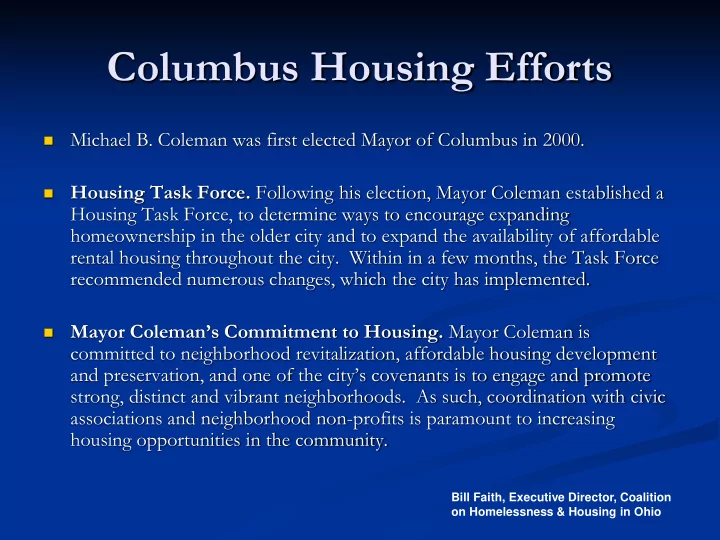

Columbus Housing Efforts Michael B. Coleman was first elected Mayor of Columbus in 2000. Housing Task Force. Following his election, Mayor Coleman established a Housing Task Force, to determine ways to encourage expanding homeownership in the older city and to expand the availability of affordable rental housing throughout the city. Within in a few months, the Task Force recommended numerous changes, which the city has implemented. Mayor Coleman’s Commitment to Housing. Mayor Coleman is committed to neighborhood revitalization, affordable housing development and preservation, and one of the city’s covenants is to engage and promote strong, distinct and vibrant neighborhoods. As such, coordination with civic associations and neighborhood non-profits is paramount to increasing housing opportunities in the community. Bill Faith, Executive Director, Coalition on Homelessness & Housing in Ohio
Columbus Programs and Initiatives Columbus/ Franklin County Housing Trust Corporation. Established with a dedicated revenue stream of $1 million from the city Hotel/Motel Tax. This amount was then matched by Franklin County with $1 million from County General Funds (this was recently changed to dedicated funding from the real estate transfer fee). One-Stop Shop. Developed to streamline the regulatory process that impact on housing production and affordability, which may include building, zoning and development codes, permitting and approval processes. Housing Incentives. Developed housing incentives, such as the tax abatements, tax- increment financing, utility tap-in fees, and other tools to encourage the development of housing downtown and in other parts of the central city. Neighborhood Investment Districts. In 2001 the city created 5 NIDs as an incentive for housing development activities in certain inner city neighborhoods. Areas were selected due to poverty, vacant structures, school enrollment reductions and lower property valuation. Bill Faith, Executive Director, Coalition on Homelessness & Housing in Ohio
Columbus Programs and Initiatives - cont Community Development Collaborative of Greater Columbus. The Housing Division provides operating support to the Community Development Collaborative of Greater Columbus (CD Collaborative) to assist Community Housing Development Organizations. Housing Development Program. Designed to foster homeownership in the Neighborhood Investment Districts (NIDs). The program provides gap financing of up to $30,000.00 per unit in the form of a forgivable loan. Housing Incentive Program. uses capital improvement funds to provide financial incentives for the creation of affordable housing in defined areas especially the NIDs. Rental Housing Production and Preservation Program. provides financial assistance to affordable multi-family rental housing projects that serve low and extremely low income households. Bill Faith, Executive Director, Coalition on Homelessness & Housing in Ohio
Columbus City Partnerships The Housing Division also works in cooperation with faith-based nonprofits to facilitate projects by combining available programs and resources. Example Greenview Estates. In partnership with the City of Columbus and the Building Industry Association (BIA), MiraCit Community Development Corporation (a local faith based nonprofit) will develop a subdivision, Greenview Estates. Currently owned by the City of Columbus, the 11-acre site is being granted to MiraCit to create 30 buildable lots with homes being constructed utilizing “green” building concepts. Other Efforts As part of Mayor Coleman's housing initiatives and in conjunction with Columbus city council the city issued a $2,000,000 housing bond in December 2005. This funding commitment was the first time bond proceeds were allocated for direct housing activities. The program has housing preservation component, an infill housing development component that also includes acquisition rehabilitation/resale and also an the Emergency Shelter Rehabilitation program Bill Faith, Executive Director, Coalition on Homelessness & Housing in Ohio
Plan for Home Again Initiative At the February 23 State of the City Address Mayor Michael B. Coleman announced his Home Again Initiative proposing to allocate $25 million over six years toward vacant and abandoned housing. There are approximately 3,200 vacant houses in the City, 376 designated as the worst of the worst. The Mayor proposed a five-point plan for Home Again: Enforcement 1. Prevention 2. Acquisition 3. Rehabilitation 4. Demolition 5. Bill Faith, Executive Director, Coalition on Homelessness & Housing in Ohio
Bill Faith, Executive Director, Coalition on Homelessness & Housing in Ohio
Bill Faith, Executive Director, Coalition on Homelessness & Housing in Ohio
Bill Faith, Executive Director, Coalition on Homelessness & Housing in Ohio
Recommend
More recommend